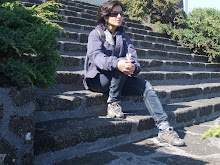 Daniel Biss speaking to members of the Asian American community. He is a Democratic candidate for the Illinois House of Representatives in the 17th District. Biss is currently Assistant Professor of mathematics at The University of Chicago.
Daniel Biss speaking to members of the Asian American community. He is a Democratic candidate for the Illinois House of Representatives in the 17th District. Biss is currently Assistant Professor of mathematics at The University of Chicago. Asian Americans who came out to endorse Daniel Biss, listen to his speech as he spells out some of his key priorities if elected.
Asian Americans who came out to endorse Daniel Biss, listen to his speech as he spells out some of his key priorities if elected.In a small crowded room in Skokie in Illinois, leaders of the Asian American community gathered on July 10th to endorse Daniel Biss. 30 year old Biss, an Assistant Professor of mathematics at The University of Chicago is a Democratic candidate for the Illinois House of Representative in the 17th District.
Speaking before an audience of around 25 people on a stormy night, Biss said, “The most important thing is that though I’m not Asian American I can pledge to you with absolute confidence that if bad decisions continue to be made they will never be made because no ones listening to the community and they’ll never be made without actively seeking out the community for advise and support.”
Judge Sandra Otaka, the first Asian Pacific American appointed to the bench by the Illinois Supreme Court introduced the speakers and endorsed Daniel Biss. She said, “We do not need to continue to elect same old same old.”
The other endorsement speeches were made by Jerry Clarito a Filipino-American and Vice President of the Skokie Park District, Gina Lee, a Korean-American and social worker at the YWCA and finally Pramod Shah an Indian American and Niles Township Trustee.
Pramod Shah said, “As one of the few elected officials of Asian descent it is obvious to me that Asian Americans are under represented at all levels of government from the city of Chicago to suburban municipalities and last but certainly not least at the state level.”
Shah added, “After working with Daniel I can say with certainty that he will be an advocate for the Asian American community.”
Daniel Biss is a mathematician with a Ph.D from MIT and an undergraduate degree from Harvard University. He volunteers as a math teacher at a charter school in Chicago and feels strongly about improving education in Illinois where per pupil spending is one of the lowest in the country. Calling it “shameful” he said, “It’s an indication that Springfield’s priorities don’t have anything to do with investing in the state of Illinois’ future.”
To change that he is counting on the support of the nearly 13,000 Asian Americans residing in the 17th District to show up to vote for him on November 4th. He said, “This election wouldn’t be possible without the Asian American community.”
Everyone laughed when he said, “You can cash that in after I’ve won.”
Speaking before an audience of around 25 people on a stormy night, Biss said, “The most important thing is that though I’m not Asian American I can pledge to you with absolute confidence that if bad decisions continue to be made they will never be made because no ones listening to the community and they’ll never be made without actively seeking out the community for advise and support.”
Judge Sandra Otaka, the first Asian Pacific American appointed to the bench by the Illinois Supreme Court introduced the speakers and endorsed Daniel Biss. She said, “We do not need to continue to elect same old same old.”
The other endorsement speeches were made by Jerry Clarito a Filipino-American and Vice President of the Skokie Park District, Gina Lee, a Korean-American and social worker at the YWCA and finally Pramod Shah an Indian American and Niles Township Trustee.
Pramod Shah said, “As one of the few elected officials of Asian descent it is obvious to me that Asian Americans are under represented at all levels of government from the city of Chicago to suburban municipalities and last but certainly not least at the state level.”
Shah added, “After working with Daniel I can say with certainty that he will be an advocate for the Asian American community.”
Daniel Biss is a mathematician with a Ph.D from MIT and an undergraduate degree from Harvard University. He volunteers as a math teacher at a charter school in Chicago and feels strongly about improving education in Illinois where per pupil spending is one of the lowest in the country. Calling it “shameful” he said, “It’s an indication that Springfield’s priorities don’t have anything to do with investing in the state of Illinois’ future.”
To change that he is counting on the support of the nearly 13,000 Asian Americans residing in the 17th District to show up to vote for him on November 4th. He said, “This election wouldn’t be possible without the Asian American community.”
Everyone laughed when he said, “You can cash that in after I’ve won.”











